Toothpaste as a lip plumper is more of a myth than actual magic. Some people believe that putting toothpaste on their lips will temporarily increase their size or make them appear fuller. This belief is frequently based on the tingling or mild burning sensation caused by toothpaste containing menthol or peppermint. The tingling sensation may cause temporary swelling or irritation, resulting in the appearance of slightly larger lips. However, this effect is minor, temporary, and not recommended due to the risk of skin irritation or allergic reactions. Toothpaste is not designed or intended for use on the lips, and its ingredients may be harsh on the delicate skin of the lips, causing dryness or irritation.
The Truth Behind Toothpaste as a Lip Plumper
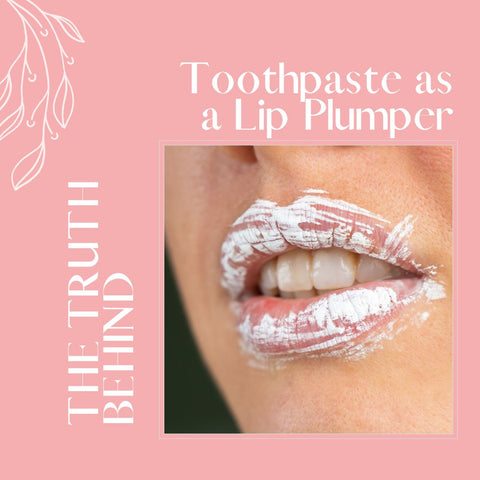
Toothpaste has occasionally been used as a DIY lip plumper because it can cause tingling or mild burning on the lips. Some toothpaste formulations contain ingredients such as menthol or peppermint oil, which cause a tingling sensation. The reasoning behind using toothpaste as a lip plumper is that the tingling sensation may cause temporary irritation or mild swelling, making the lips appear slightly fuller. However, any perceived plumping effect from toothpaste is only temporary and minimal. While some people may experience temporary swelling or irritation as a result of toothpaste's tingling sensation, this method is not recommended for a variety of reasons, including skin irritation, potential allergic reactions, and long-term effects.
How Toothpaste Allegedly Enhances Lip Volume
Some people have suggested using toothpaste to temporarily increase lip volume because of the tingling sensation it can cause on the lips. However, no scientific evidence supports the claim that toothpaste can significantly increase lip size or volume. Certain toothpaste formulations cause a tingling sensation because they contain ingredients such as menthol, peppermint oil, or other flavouring agents. This sensation may cause mild irritation or temporary swelling, leading some people to believe that their lips are slightly fuller after using toothpaste.
Here's a quick overview of how this theory works:
-
Irritation and Blood Flow: Toothpaste's tingling sensation can stimulate blood flow to the lips, causing temporary swelling or redness. This increase in blood flow may produce a short-term plumping effect.
-
Drying Effect: Certain toothpaste formulas contain ingredients that can cause dryness or irritation. This may cause the lips to swell temporarily as the body reacts to the irritation.
However, any noticeable increase in lip size caused by toothpaste use is likely to be minor and only temporary. Furthermore, the potential risks outweigh the advantages:
-
Skin irritation: Toothpaste contains abrasive and cleansing agents designed for teeth and gums, not the delicate skin of the lips. Applying toothpaste to the lips can cause dryness, irritation, or allergic reactions, particularly in people with sensitive skin.
-
No Long-Lasting Effect: If toothpaste has a temporary plumping effect, it is short-lived and not a permanent solution for fuller lips.
Individuals looking to increase their lip volume have safer and more effective alternatives available.
-
Dedicated Lip Plumping Products: Many cosmetic brands sell lip plumping glosses or balms that are specifically designed to give the lips a fuller appearance. These products frequently include ingredients such as hyaluronic acid or peptides, which can provide temporary volume without irritation.
-
Professional Procedures: Cosmetic procedures such as lip fillers or injections performed by trained professionals can provide more significant and long-lasting results for increasing lip volume.
Ingredients in Toothpaste That Affect Lips
Toothpaste typically contains a variety of ingredients, some of which may irritate the lips if applied topically. However, it is important to note that toothpaste is designed for use on teeth and gums, not on the delicate skin of the lips. Some of the most common ingredients found in toothpaste include flavouring agents (e.g., menthol, peppermint oil), detergents (e.g., sodium lauryl sulphate, or SLS), abrasive particles, fluoride, artificial colours, and preservatives, all of which can affect the lips. Because of these potential side effects, it is best to avoid applying toothpaste directly to the lips to improve their condition. Instead, if someone wants fuller lips or a plumping effect, it is safer to use products that are specifically designed for that purpose, such as lip plumpers or lip care products that contain safe and tested ingredients for use on the lips. Using toothpaste on your lips can cause dryness, irritation, or allergic reactions, and it is not a recommended or reliable way to get fuller lips.
Pros and Cons of Using Toothpaste on Lips
Using toothpaste on the lips is generally not recommended due to the risk of side effects. While some people may experiment with toothpaste to achieve a tingling sensation or temporary plumping effect on the lips, it's important to consider the potential pros and cons:
Pros:
-
Temporary Tingling Sensation: When toothpaste is applied to the lips, certain formulations, such as those containing menthol or peppermint oil, can cause a tingling or cooling sensation. This feeling may be stimulating or refreshing to some people.
-
Possible Transient Swelling: Some toothpaste ingredients can cause tingling that could result in mild irritation or transient swelling, giving the impression that the lips are slightly fuller for a brief while. This effect, though, differs from person to person and is frequently insignificant.
Cons:
-
Skin irritation: Toothpaste has abrasive and possibly irritating ingredients in its formulation, which is intended to clean teeth. Toothpaste application can cause dryness, redness, or irritation on the lips' delicate skin. In certain cases, prolonged contact can result in allergic reactions or even chapping.
-
Dryness and Chapping: Detergents and abrasive particles found in toothpaste can cause the lips to lose moisture, which can eventually cause chapping.
-
Possible Allergic Reactions: Certain ingredients in toothpaste may cause allergies or sensitivities in some people, which can have negative effects like lip rash, redness, or itching.
-
Absence of Benefits Particular to Lips: Toothpaste is not made to be applied on the lips, and it does not contain any ingredients that are intended to protect or nourish the sensitive skin around the lips.
-
Minimal and Temporary Effect: Any alleged swelling or plumping caused by toothpaste is typically very slight and only lasts a short while.
It is best to stay away from applying toothpaste to the lips for any cosmetic or lip-volumpuring purposes due to these possible risks and downsides. Individuals who want fuller lips or to care for their lip skin should instead use lip care or lip-plumping products that are specifically designed for the lips. These products are intended to provide benefits while avoiding irritation or adverse reactions to the sensitive lip area.
Safe and Effective Alternatives to Toothpaste for Lip Care
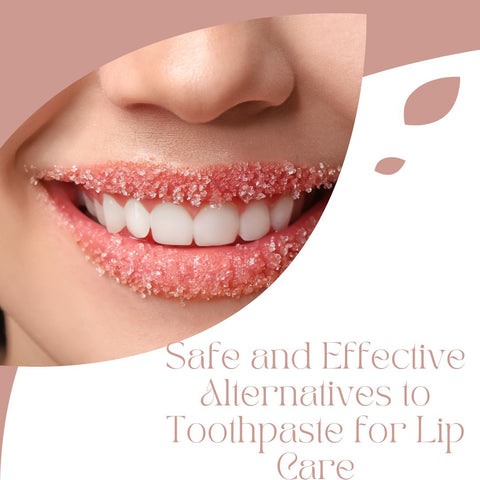
There are several safe and effective alternatives to toothpaste for lip care. These alternatives are specifically designed to nourish, hydrate, and protect the delicate skin of the lips while avoiding the risks associated with toothpaste. Here are a few alternatives:
-
Lip Balms or Lip Salves: These products are intended to moisturise and protect the lips. Look for lip balms with ingredients such as beeswax, shea butter, cocoa butter, coconut oil, almond oil, or jojoba oil. These ingredients moisturise and soothe dry, chapped lips.
-
Lip Scrubs: Exfoliating the lips can help remove dead skin cells, leaving them smoother and healthier. You can make a DIY lip scrub with sugar, honey, and coconut oil, or buy commercially available lip scrubs that are gentle and designed specifically for the lips.
-
Lip Masks: Like face masks, lip masks are intended to provide intense hydration and nourishment to the lips. They frequently include ingredients such as hyaluronic acid, ceramides, or plant-based oils to deeply moisturise and rejuvenate the lips.
-
Lip oils: Various oils, such as rosehip, grapeseed, or argan oil, are present in these lightweight, hydrating products. They feel neither greasy nor heavy, instead helping to soften and nourish the lips.
-
Petroleum Jelly and Aquaphor: These products form a barrier that shields the lips from moisture loss by keeping them sealed in. They can be useful for soothing and moisturising lips that are dry or cracked.
-
Natural Remedies: When applied topically to the lips, some natural ingredients, such as aloe vera gel, cucumber slices, or green tea bags (after brewing and cooling), can also be calming.
The following advice should be taken into consideration when selecting lip care products or toothpaste substitutes:
-
Look for products designed specifically for the lips to ensure that they contain gentle and nourishing ingredients that are appropriate for delicate lip skin.
-
Avoid products that contain harsh chemicals, fragrances, or potential irritants that could dry out or irritate your lips.
-
Before using a new product, conduct a patch test, especially if you have sensitive skin or known allergies, to ensure that there is no adverse reaction.
Regular use of these lip care alternatives can help keep your lips moisturised, soft, and healthy while avoiding the risks associated with toothpaste.
Natural Remedies for Achieving Plumper Lips
Natural methods of getting plumper lips can only slightly improve your lips and are usually only temporary. However, it is important to note that the results are not as dramatic or long-lasting as those obtained through cosmetic procedures or specialised lip-plumping products. Here are some natural remedies that people frequently use:
-
Exfoliation: Gently exfoliating the lips with a soft toothbrush or a homemade lip scrub (containing sugar, honey, or coconut oil) can help remove dead skin cells and promote blood circulation, giving the lips a temporarily fuller appearance.
-
Cinnamon or Cayenne Pepper: These spices can cause mild irritation and increase blood flow to the lips, resulting in temporary swelling. However, use these with caution and in moderation because they can cause irritation or allergic reactions in some people.
-
Peppermint Oil: Applying diluted peppermint oil to the lips may cause tingling and swelling due to increased blood flow. However, it is critical to dilute it correctly to avoid irritation.
-
Hydration: Drinking plenty of water can help keep your lips plump and moisturised. Dehydration can make lips appear thinner and drier.
-
Cold Compress: Using a cold compress, such as a chilled spoon or a cold cloth, can temporarily constrict blood vessels and reduce inflammation, resulting in slightly plumper lips.
-
Hyaluronic Acid or Vitamin E: Natural ingredients such as aloe vera gel, vitamin E oil, or hyaluronic acid can help moisturise the lips, making them look smoother and fuller.
The effects of these natural remedies are typically transient and subtle, so it is important to approach them cautiously. Some of these treatments may also irritate certain people or trigger allergic reactions. Always perform a patch test on your lips before applying any new substance to avoid an allergic reaction. Consider cosmetic procedures such as lip fillers or lip injections performed by qualified professionals for more visible and long-lasting results in plumper lips. These procedures involve the use of safe, FDA-approved substances and offer more significant benefits than natural remedies.
Comparing Toothpaste to Professional Lip Plumping Methods
It's like comparing apples to oranges when comparing toothpaste, a substance used for oral care at home, to procedures used by professionals to plump lips. Toothpaste is not thought to be a secure or reliable way to get larger lips because it is not designed with lip enhancement in mind. On the other hand, professional lip plumping techniques include aesthetic operations carried out by licenced professionals with the express goal of enhancing lip volume. Here is how toothpaste and expert lip plumping techniques differ:
-
Ingredients and Purpose: Toothpaste: Mainly designed to clean teeth and prevent cavities, it contains oral hygiene ingredients like abrasives, detergents, and flavouring agents. Because toothpaste has harsh ingredients, applying it to your lips could irritate them or cause dryness or allergic reactions. Professional Lip Plumping Techniques: These techniques use FDA-approved, safe ingredients such as collagen or hyaluronic acid in injection form or lip fillers. These substances are specifically formulated for cosmetic use to increase lip volume and shape, producing more visible and long-lasting results than home remedies or toothpaste.
-
Effectiveness: Toothpaste: Any perceived plumping effect from toothpaste on the lips is minimal, temporary, and primarily due to the tingling or mild irritation it may cause. The results, if any, are fleeting and insignificant. Professional Lip Plumping Methods: Skilled professionals use FDA-approved substances and precise techniques to achieve long-lasting lip enhancements. The results are more noticeable and can last several months to a year or more, depending on the type of filler used.
-
Safety and Risks: Toothpaste: Applying toothpaste to the lips can cause dryness, irritation, or allergic reactions due to its formulation, which is not suitable for delicate lip skin. There may be negative effects from continued use. Professional Lip Plumping Methods: These procedures are generally safe when carried out in a clinical setting by qualified practitioners using approved substances. However, there is a chance of mild side effects like bruising, asymmetry, or swelling, just like with any cosmetic procedure. Professionals with experience carry fewer risks when performing these tasks.
Maintaining Lip Health with Safe Ingredients
To maintain lip health, use gentle and nourishing ingredients that keep the lips moisturised, soft, and protected. The following are some safe and beneficial ingredients commonly found in lip care products:
-
Beeswax: It creates a barrier of defence over the lips to keep moisture in and stop dehydration. Beeswax keeps the lips hydrated without making them feel greasy by assisting in moisture retention.
-
Shea Butter: Packed with vitamins and fatty acids, this organic fat is derived from the shea tree. It promotes softness and smoothness by richly hydrating and nourishing the lips.
-
Jojoba Oil: Jojoba oil moisturises lips without clogging pores, much like the natural oils found in the skin. It offers hydration and is easily absorbed.
-
Coconut Oil: Well-known for its emollient qualities, coconut oil aids in lip conditioning and moisturization. It has a fatty acid content that protects and nourishes the skin.
-
Vitamin E: Its anti-oxidant qualities aid in shielding the lips from harm from free radicals. Vitamin E also helps to moisturise and repair dry, chapped lips.
-
Hyaluronic Acid: This hydrating ingredient helps the lips retain moisture, which improves their texture and plumpness. It can hold water molecules, ensuring long-term hydration.
-
Aloe Vera: Aloe vera gel, known for its soothing properties, can soothe irritated or chapped lips while also providing moisture and promoting healing.
When selecting lip care products, particularly lip balms and treatments, look for formulations that include these safe and effective ingredients. Avoid products that contain irritants, fragrances, or harsh chemicals, as these can cause dryness, irritation, or allergic reactions on the delicate lip skin. Furthermore, staying hydrated by drinking plenty of water, protecting the lips from harsh weather conditions (such as sun exposure or cold winds), and applying lip balms or treatments regularly can all help to keep the lips healthy and nourished. If you have sensitive skin or known allergies, you should always do a patch test before using a new lip product to make sure you do not have any negative reactions. You can maintain the softness, hydration, and condition of your lips by using products with safe and healthy ingredients regularly.
Debunking Myths: The Reality of DIY Lip Plumping Hacks
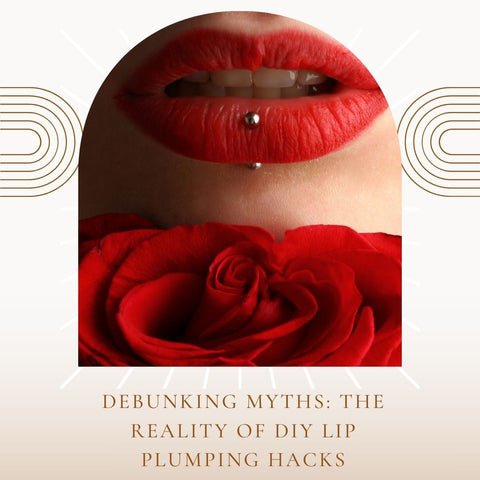
There have been several DIY lip plumping hacks circulated, many of which claim to provide fuller lips by using household items or unconventional methods. Let us debunk some of these myths and determine their true effectiveness:
-
Toothpaste: Myth: Some claim that applying toothpaste to the lips can temporarily plump them due to the tingling sensation. Reality: Toothpaste is not intended for use on the lips. The tingling sensation may cause temporary irritation or swelling, but it can also result in dryness, redness, or allergic reactions, making it an unsafe method.
-
Cinnamon and Cayenne Pepper: Myth: These spices are said to irritate the lips, causing temporary swelling and increased blood flow. Reality: While they may irritate and tingle, using them on your lips can be harsh and cause burning, redness, or allergic reactions.
-
Suction Devices: Myth: Some DIY hacks use small suction devices or shot glasses to suction the lips, causing temporary swelling. Reality: These methods can cause severe bruising, broken blood vessels, and even permanent lip damage. They are not recommended for safety reasons.
-
DIY Lip Scrubs: Myth: Exfoliating the lips with homemade lip scrubs (such as sugar mixed with oil) may increase blood circulation, giving the lips a fuller appearance. Reality: Lip exfoliation can help remove dead skin cells, but the effect on lip volume is minimal and only temporary.
-
Peppermint Oil or Menthol: Myth: It's suggested that applying diluted peppermint oil or menthol to the lips can create a tingling sensation and temporarily plump the lips. Reality: Although these ingredients may temporarily give you a tingling sensation, they can also cause allergic reactions, irritation, or dryness on your lips, so you should not use them frequently.
The truth is that most DIY lip-plumping hacks have minimal and temporary effects, if any, and can pose serious risks. These methods are unregulated, and the ingredients used may not be suitable for application to delicate lip skin. Furthermore, some of these practices may result in adverse reactions, irritation, or long-term damage. For those seeking more visible and safer results in achieving fuller lips, professional cosmetic procedures such as lip fillers performed by qualified practitioners or the use of specialised lip-plumping products specifically formulated for this purpose are recommended. These methods provide more significant and long-term benefits while maintaining safety and minimising potential risks or side effects.
Analyzing the Efficacy of Toothpaste for Lip Enhancement
Toothpaste is not meant to be used for lip augmentation. There is no scientific proof that toothpaste works as a lip enhancer, even though some people think it can temporarily give their lips a plump appearance because of the tingling sensation it may cause. The idea behind using toothpaste to improve lips is predicated on specific components that are present in some toothpaste formulations, such as menthol or peppermint oil. These ingredients can create a tingling or mild burning sensation when applied to the lips, which might lead to temporary irritation or mild swelling. However, the perceived plumping effect of toothpaste is minimal and brief, owing primarily to the temporary irritation caused by these ingredients. Here are some reasons why toothpaste is not regarded as a reliable or safe method for lip enhancement:
-
Skin Irritation: Toothpaste contains abrasives, detergents, and flavouring agents that are primarily designed to clean teeth. These ingredients can be harsh on the sensitive skin of the lips, causing dryness, redness, and allergic reactions.
-
Temporary Effect: Any plumping effect from toothpaste is usually short-lived and minimal. The mild irritation or swelling is usually temporary and may not result in the desired or noticeable improvement.
-
Potential Risks: Prolonged use of toothpaste on the lips can cause dryness, chapping, or even adverse reactions due to the unsuitability of toothpaste ingredients for lips.
-
Lack of Lip-Specific Benefits: Toothpaste contains no ingredients specifically designed to enhance the lips or provide long-term benefits to lip skin health.
For those looking for true and effective lip enhancement, it is safer to use dedicated lip-plumping products specifically formulated for the lips or professional cosmetic procedures such as lip fillers performed by qualified practitioners. These methods use ingredients or techniques specifically intended for lip enhancement and offer more noticeable, safer, and longer-lasting results compared to using toothpaste.
Risks and Precautions When Using Household Items on Lips
Using household items on the lips for cosmetic purposes, particularly when they are not specifically formulated for skin application, can present risks and potential hazards. Here are some risks and precautions to consider when applying household items to the lips:
-
Irritation and Allergic Reactions: When applied to the delicate skin of the lips, household items such as spices (like cinnamon or cayenne pepper), essential oils, or other unusual substances can cause irritation, redness, or allergic reactions. Individuals may have varying sensitivities or allergies to specific substances, resulting in adverse skin reactions.
-
Dryness and Chapping: Certain household items may have drying properties that remove moisture from the lips, resulting in dryness, chapping, or flakiness. This can worsen lip sensitivity and discomfort.
-
Chemical Burns or Skin Damage: When harsh or abrasive household items, such as certain spices or cleaning agents, are applied directly, they can cause chemical burns, micro-tears, or lip skin damage.
-
Infection or Contamination: Household items may not be sterile or suitable for skin application. Applying items that have not been cleaned or properly handled can introduce bacteria or contaminants into the lips, increasing the risk of infection or skin problems.
-
Misalignment or Misshaping: DIY methods that use suction devices or unusual techniques may result in bruising, swelling, or misalignment of the lips. These methods can be risky and potentially cause lasting damage or deformities.
Precautions to Take:
-
Before applying any household item or substance to your lips, test a small area of skin for adverse reactions or sensitivity.
-
Avoid using harsh, abrasive, or potentially irritating products on your lips. Choose gentle, lip-safe ingredients.
-
If you are thinking about trying any unconventional lip enhancement methods, talk to a dermatologist or healthcare professional first. They can offer advice and ensure safety.
-
Rather than using household items, consider using lip balms or treatments containing safe and tested ingredients intended for skin application.
-
If you experience any discomfort, irritation, or adverse reactions on your lips after using a household item, stop immediately and seek medical attention if necessary.
In general, lip safety should always come first and common household objects should never be used cosmetically on the lips due to the potential risks and negative effects they may have on the sensitive skin around the lips.
Expert Opinions on Toothpaste Lip Plumping
Dental and skincare professionals frequently advise against using toothpaste as a lip plumper for several reasons:
-
Toothpaste is designed for oral hygiene, specifically to clean teeth and gums. Its ingredients, including abrasives, detergents, and flavouring agents, are not suitable for use on the delicate skin of the lips.
-
Menthol, peppermint oil, and abrasives in toothpaste can cause irritation, dryness, or allergic reactions when applied to the lips. Prolonged use or sensitivity to these ingredients may result in adverse skin reactions.
-
Any perceived plumping effect from toothpaste is typically minimal and fleeting. The tingling sensation or mild irritation caused by toothpaste can cause temporary swelling or redness, but it does not provide significant or long-term lip enhancement.
-
Toothpaste has the potential to dry out the lips, causing chapping or exacerbating pre-existing dryness. The skin on the lips is thinner and more sensitive than in other areas, making it prone to irritation.
Dental and skincare professionals recommend using lip care products, such as lip balms, treatments, and cosmetics designed to enhance the lips. These products contain safe ingredients designed to nourish, moisturise, and protect the lips without causing irritation or adverse reactions. Furthermore, those interested in improving the appearance of their lips should consult dermatologists, cosmetic professionals, or healthcare providers. Professional guidance ensures that safe and effective methods for achieving fuller lips are used, without causing harm or irritation to the delicate skin on the lips.
Conclusion: Rethinking Lip Care and Enhancement
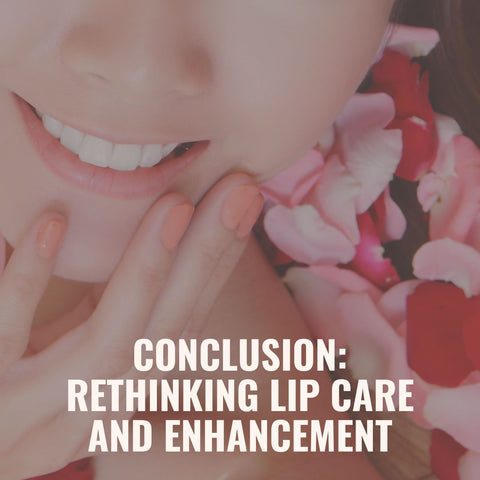
Using mild lotions designed for the lips, drinking plenty of water, and shielding the lips from outside stresses are all important components of good lip care. When thinking about lip augmentation, put safety first and seek professional advice and treatments from experts. Using tried-and-true, safe techniques guarantees softer, healthier, and possibly larger lips without running the danger of unfavourable side effects or harming the sensitive skin around the lips. In any practice involving lip care or improvement, safety and health should always come first.
Personal Experiences with Toothpaste Lip Plumping
While some people have tried using toothpaste as a DIY method for temporarily fuller lips due to the tingling sensation it can cause, the results and experiences vary greatly. Here are some common observations.
-
Temporary Sensation: When toothpaste is applied to the lips, many users report feeling a tingling or cooling sensation. Some people find this sensation invigorating or refreshing.
-
Minimal Plumping Effect: Some people may experience a slight temporary swelling or redness after using toothpaste, which contributes to the appearance of slightly fuller lips. However, this effect is usually subtle and short-lived.
-
Discomfort and Irritation: Many users report experiencing discomfort or irritation on their lips after applying toothpaste. The toothpaste ingredients can cause dryness, tingling, or even burning sensations.
-
Mixed Results: Some people report mild improvements in lip fullness, while others see no difference or find the method uncomfortable and not worth repeating.
It is important to note that professionals do not recommend using toothpaste for lip plumping because of the risk of irritation, dryness, or allergic reactions. The delicate skin of the lips can be sensitive to toothpaste ingredients, resulting in adverse effects. Individuals looking for more effective and safer ways to achieve fuller lips should use dedicated lip-plumping products or consult with professionals about cosmetic procedures such as lip fillers. These options provide more noticeable and long-lasting results while avoiding the risks associated with using toothpaste on the lips.
Future Trends in Natural Lip Care Methods
Looking ahead, here are some possible future trends in natural lip care methods.
-
Clean and Sustainable Ingredients: Consumers are becoming more aware of the ingredients in their skincare products, preferring clean, non-toxic, and responsibly sourced ingredients. Future natural lip care methods are likely to incorporate eco-friendly and ethically sourced ingredients, such as organic plant-based oils, beeswax, shea butter, and botanical extracts.
-
Adoption of Innovative Natural Ingredients: Natural skincare innovations may include new plant-based or bioactive ingredients that have specific lip health benefits. Ingredients with antioxidant-rich fruit extracts, probiotics, adaptogens, or novel botanical blends may emerge for their hydrating, nourishing, and protective properties.
-
Personalisation and customisation: The trend towards personalised skincare may extend to lip care. Future methods could include customisable lip care products tailored to individual needs, allowing users to choose ingredients or formulations that are appropriate for their lip concerns, preferences, or sensitivities.
-
Focus on Holistic Lip Health: Beyond just external care, future natural lip care methods may include holistic approaches. This could include lifestyle recommendations like dietary changes, hydration strategies, and stress-reduction techniques that help with overall lip health.
-
Technological Advancements in Natural Products: Technological advancements may enable better extraction, formulation, and delivery of natural ingredients, resulting in increased efficacy in lip care products. This could include advancements in extraction methods, encapsulation technologies, or environmentally friendly packaging.
-
Cultural Influences and Traditional Remedies: Traditional remedies from different cultures may become more popular in natural lip care. Ingredients or practices derived from cultural traditions, such as Ayurveda or traditional Chinese medicine, may be investigated further for their potential benefits in lip care.
-
Integration of Beauty and Wellness: The convergence of beauty and wellness may drive natural lip care methods that focus not only on aesthetics but also on overall health. This could include lip care products containing adaptogens, vitamins, or ingredients that promote stress relief or emotional well-being.
Making Informed Choices in Lip Enhancement Techniques
Considering personal tastes, conducting in-depth research, and speaking with experts are all necessary when selecting lip enhancement procedures. The following are steps to help you make well-informed decisions about lip enhancement: Research different techniques, speak with experts, weigh advantages and disadvantages, think about long-term effects, look at before-and-after pictures, ask questions, think about results that look natural, comprehend financing options, read reviews and suggestions, and take your time. Deciding to get lip augmentation surgery should be thoughtful and unique. You may select lip augmentation procedures that better suit your expectations and tastes by educating yourself, consulting a specialist, and taking your aesthetic goals into account.
Navigating the World of DIY Lip Plumping Safely
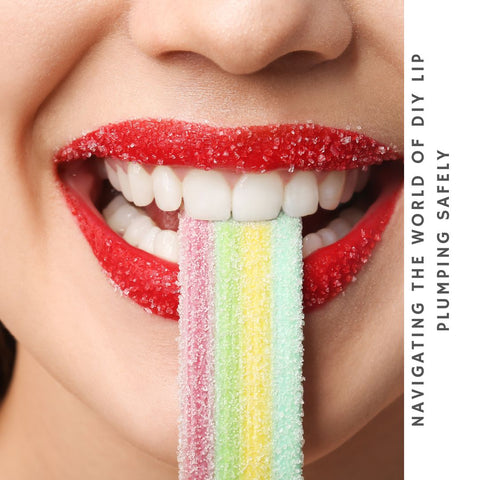
When considering DIY lip plumping methods, safety should be the priority. While professional cosmetic procedures or specialised products are safer and more effective for lip enhancement, if you are exploring DIY methods, here's how to navigate them more safely: Research thoroughly, patch test, avoid harsh ingredients, use gentle and natural ingredients, dilute and patch test essential oils, avoid suction devices, limit frequency and duration, prioritise safety over temporary results, consult professionals if in doubt, and consider alternatives. It is important to note that DIY lip-plumping methods have inherent risks and may not produce significant or long-term results. Professional cosmetic procedures performed by qualified practitioners or with specialised lip-care products provide safer and more dependable options for achieving desired lip enhancements.









































